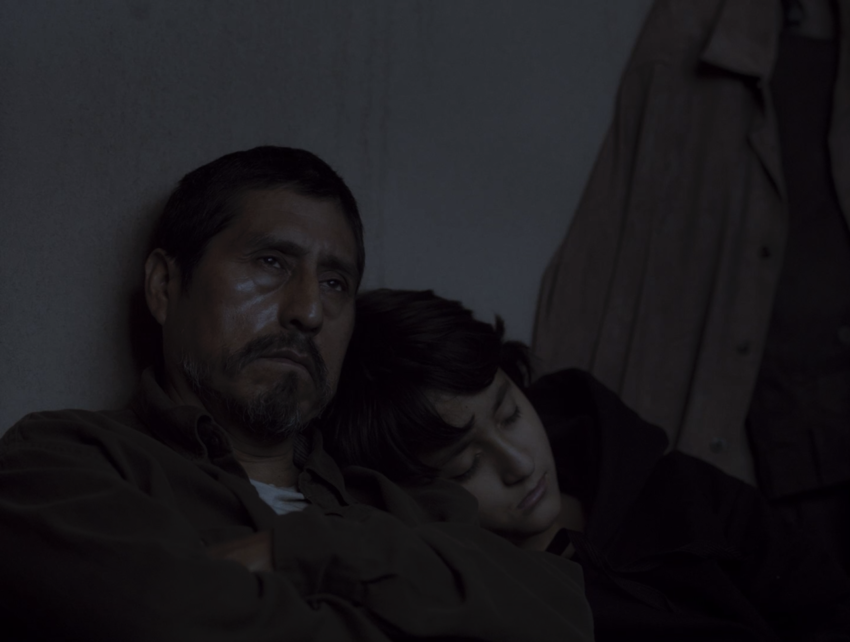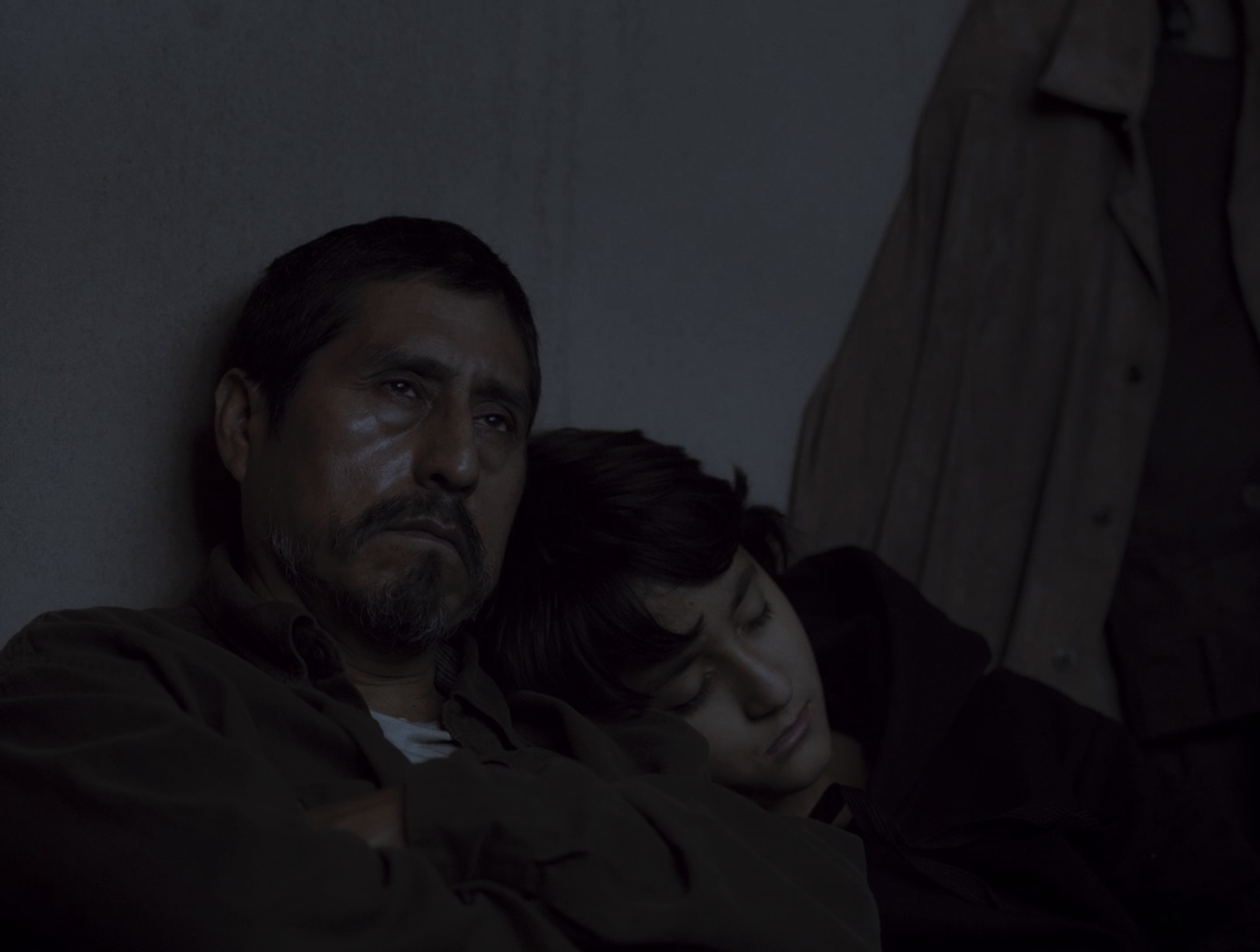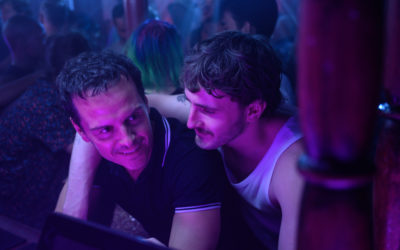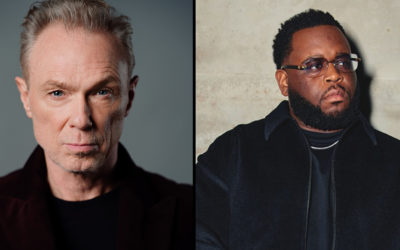
Fernando Bacillio and Lorenzo Molina in a scene from Tiempos Futuros.
HOLLYWOOD, CA (LA ELEMENTS) 6/12/2022 – “My dad” says Teo (Lorenzo Molina) in Tiempos Futuros, “says that Lima is like someone who lives in great sorrow but is unable to cry.”
And indeed, V. Checa’s film, which had its West Coast premiere at LALIFF on June 5, 2022, paints a truthful portrait of a city front and center of a very dystopian world. One whose people are made to suffer a number of indignities such as public humiliation when being evicted from their homes. And one filled with such a numbing sense of hopelessness, people feel they have no recourse with which to even consider changing their fate.
But one man is willing to try. Luis, Teo’s father, is a mechanical engineer, physicist, inventor and electrician. And despite being all of those things, he is also unemployed as he has chosen to utilize his brilliance on his grand obsession: a machine that will bring rain to the Peruvian capitol which has not seen rain in years. A rain strong enough so that “what is good will endure and what is bad will be swept away.” Played with heightened intensity by Fernando Bacillio, we understand how in a world of decay, Luis’s quixotic quest gives meaning to his life and keeps him going.
The other thing that keeps Luis going is his relationship with Teo, his 12-year-old son. Teo is not only Luis’s partner in the creation of the rain machine, he is pretty much Luis’s only human contact. While Luis is obsessed with his invention, the same can’t be said for Teo whose efforts with the machine are due only to his love for his father. He is painfully aware that everyone who knows his father also feels sorry for him.
One night while working at the packed nightclub, Samoa, Teo swiftly repairs a blown fuse. This captures the attention of a group of young criminals led by Baca, (Jeremi Garcia) who steal and sell personal information. Impressed with his resourcefulness, they try to recruit him but their offer gets rejected.
However, Teo soon realizes that his father’s dreams can only sustain them for so long. This is bluntly obvious when he comes home one night after searching for a part for the rain machine and he sees people from his building being evicted. Adding to their distress and humiliation is the ominous message, “You have refused to pay your rent. The seizure of property is in progress,” thundering from a loudspeaker. Luis is not concerned at all about their dire finances. When Teo informs him of what is happening, Luis says not to worry about it. “There are ten floors. Give or take one month per floor, we have about a year.” Not wanting to wait for the inevitable, Teo takes matters into his own hands and discovers that a minimum of 400 soles is needed to stave off their eviction. When the owner of the club turns him down for a loan, desperation leads him to finally agree to work for Baca. And that in turn sets off a series of events from which there is no turning back. Garcia does very good work in not portraying Baca as a one-dimensional bad guy. It makes an impact to see the menace give way to the occasional empathy.
But this film, with its masterful escalating sense of foreboding, clearly belongs to Molina, an actor who brings subtlety and pathos to the role of Teo. One powerful moment in Tiempos Futuros is when Teo finally gives in and joins Baca’s collective of criminals. The fleeting look of regret that turns into acceptance once he’s made this choice leaves its mark. And then you can finally understand why so few people who live in the dark world of Tiempos Futuros, are willing to fight for a better future.
We reached out to director V. Checa to learn about the casting process for his film, the inspiration for Tiempos Futuros and more.
What inspired you to write Tiempos Futuros?
The film started from finding my father working on a strange machine. From this personal link and the popularity of the city where I live, a city where it never rains, the film was born.
You portray the city of Lima amidst a very dystopian landscape. Do you feel that Lima is going through a very dark and troubled time right now?
There is no intention of reflecting the city of Lima and the present we are living as a dark and troubled time. The film is built from the tension that emanates from the relationship between Luis and Teo. The space and the sensation is the echo of this tension. However, it is inevitable not to have been influenced by a moment as shocking as the pandemic and a particular element of this time: uncertainty.
How did you discover the actors in your film?
Fernando Bacillio is an actor I had been following since the movie, El Mudo, and was the right person to play the role of Teo’s father. Lorenzo Molina, Jeremi Garcia, and Jose Flores, (Haya) were part of an extensive casting process that was mostly non-actors. Paulina Bazán, (Raisa) had already participated in other films and I considered her experience important to guide the other actors. For us it was important to be able to generate a dynamic between them and use their particular traits to reconstruct the presence of the characters.
Your movie reminded me of the myth of Daedalus and Icarus, a father and son who had only each other.
It is a very interesting comparison with the myth of Icarus and Daedalus. I think there is a kind of blindness or obsession, that Daedalus lives and that defines precisely the relationship with Icarus. A relationship where the dream and the obsession to achieve the goal seems to be a death sentence. It is precisely because of this blindness that there is an inability to hear or perceive the other. It is at this point where the dream seems to become a nightmare. In that sense, the film poses a reflection on this blindness to perceive the other, in this case, his own son.
What filmmakers have inspired and influenced you?
I really like Heddy Honigmann’s work in Metal and Melancholy. There is a short film by Armando Robles Godoy called Via Satélite that I always have in mind, and a film by Juan Javier Salazar, Recuerdos de la Lluvia.
Tell us more about your background. Such as where you studied filmmaking.
My training has been self-taught. I have tried for some periods of my life to follow a formal education, but I have felt more comfortable with an empirical approach and the encounter with other professionals, with whom one learns and unlearns.
What will be your next project?
I’m working on my next film, The Tragic Death of a Teenage Gunfighter, a futuristic western set in the northern desert of Peru.
Tiempos Futuros
In Spanish with English subtitles
Cast
Lorenzo Molina Teo
Fernando Bacillo Luis
Jeremi Garcia Baca
Paulina Bazán Raiza
Jose Flores Haya
Director
V. Checa
Writer
V. Checa
Victor Huizar
Cinematographer
Fergan Chávez-Ferrer
Executive Producer
Sebastián Cordero
Javier Salvador
Follow LA ELEMENTS on Twitter and Instagram. Like us on Facebook.





No Comments